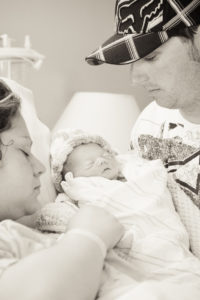

Addison Gutzwiller with her parents, Ashley and Kurt (left), and Jacob Massmann
Two local women, Kathleen Massmann of Monticello and Ashley Gutzwiller of St. Michael, share the heartache of a similar tragedy. They each had children die shortly after their births; Ashley and her husband, Kurt, lost their daughter Addison in 2010. Kathleen and her husband, Ron, lost their son Jacob in 2011.
“One in every four women has experienced a pregnancy or an infant loss,” said Massmann, who owns Healing Moments Counseling in Monticello. “Something that is so common is talked about so rarely, and is understood so little.”
There is currently a gap in coverage for stillbirth, infant and pregnancy loss support groups between Maple Grove and St. Cloud, and Kathleen and Ashley have decided to bridge that gap by teaming up to facilitate a support group for this population of grieving parents. The group will meet monthly in Monticello and is free of charge. Husbands and wives are both invited, but it’s not necessary for both to attend.
The pair said they aim to give parents space and time to share their grief and their feelings, and to ensure people don’t feel alone as they work through what has happened to them.
“We want to give hope that happiness and loss can coincide together, eventually,” Gutzwiller said.
The group will be limited to about 10 couples, but Massmann said they will open up a second group if more people are interested. The group will meet once per month for about two hours per session. The next meeting is June 28, and interested persons can contact Kathleen at 763-732-3351.
How family and friends can help
Kathleen and Ashley shared some ideas on how family or friends could support a loved one who has experienced a pregnancy or infant loss. The biggest way to help, they said, is to talk about their child with them and to remember them.
“I think it’s really common for people to say they don’t want to bring it up because they don’t want to upset someone,” Massmann said. “The biggest thing for me is helping people remember that you’re not reminding me. There’s not a day that goes by that I don’t remember him or remember that he’s not here. But when you say his name and talk about him, you’re bringing him into that room and into that day for me.
I don’t think that happens enough for bereaved parents,” she added.
When people don’t talk about what has happened to them, Massmann said parents often internalize a sense of shame that they should be moving on with their lives.
As far as things to avoid, Gutzwiller and Massmann had some suggestions. For one, Massmann said not to say or assume that the couple can simply have another child; perhaps fertility is also a challenge for them. In addition, even the fact that they could have another child doesn’t lessen the sadness about that particular child’s death.
Telling parents that their child is in a better place, or that God needed another angel, can also feel hurtful to grieving parents.
“To a mother, we don’t believe there is a better place than with us,” Gutzwiller said.
“It can cause conflict from a religious perspective,” Massmann added. “When people tell me that God needed another angel, that doesn’t work with my frame of reference of God and what God would do.”
The two both say that the most helpful thing a friend or relative can do is just to be there with the grieving parents, whether it is a day after or years after, to allow them to talk and feel without judgment.
And to not forget.